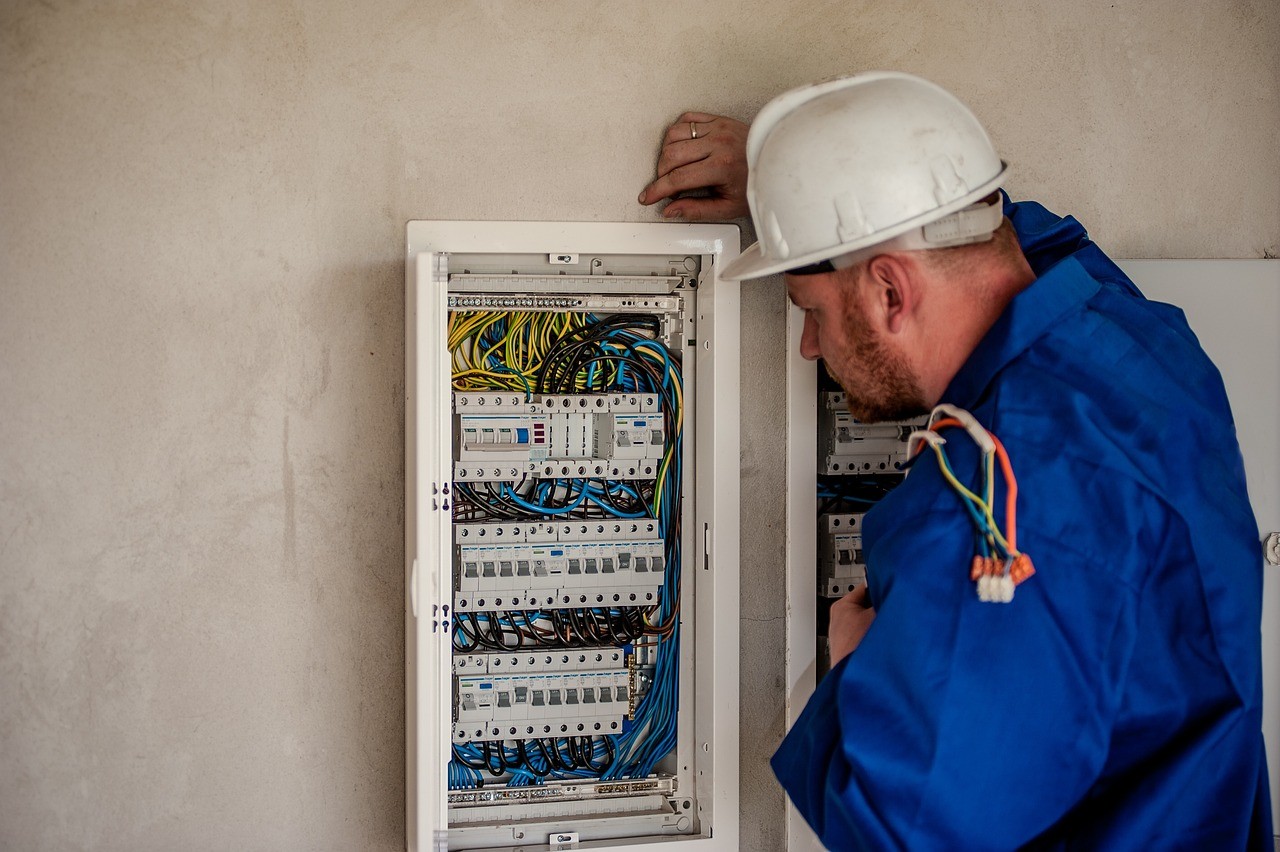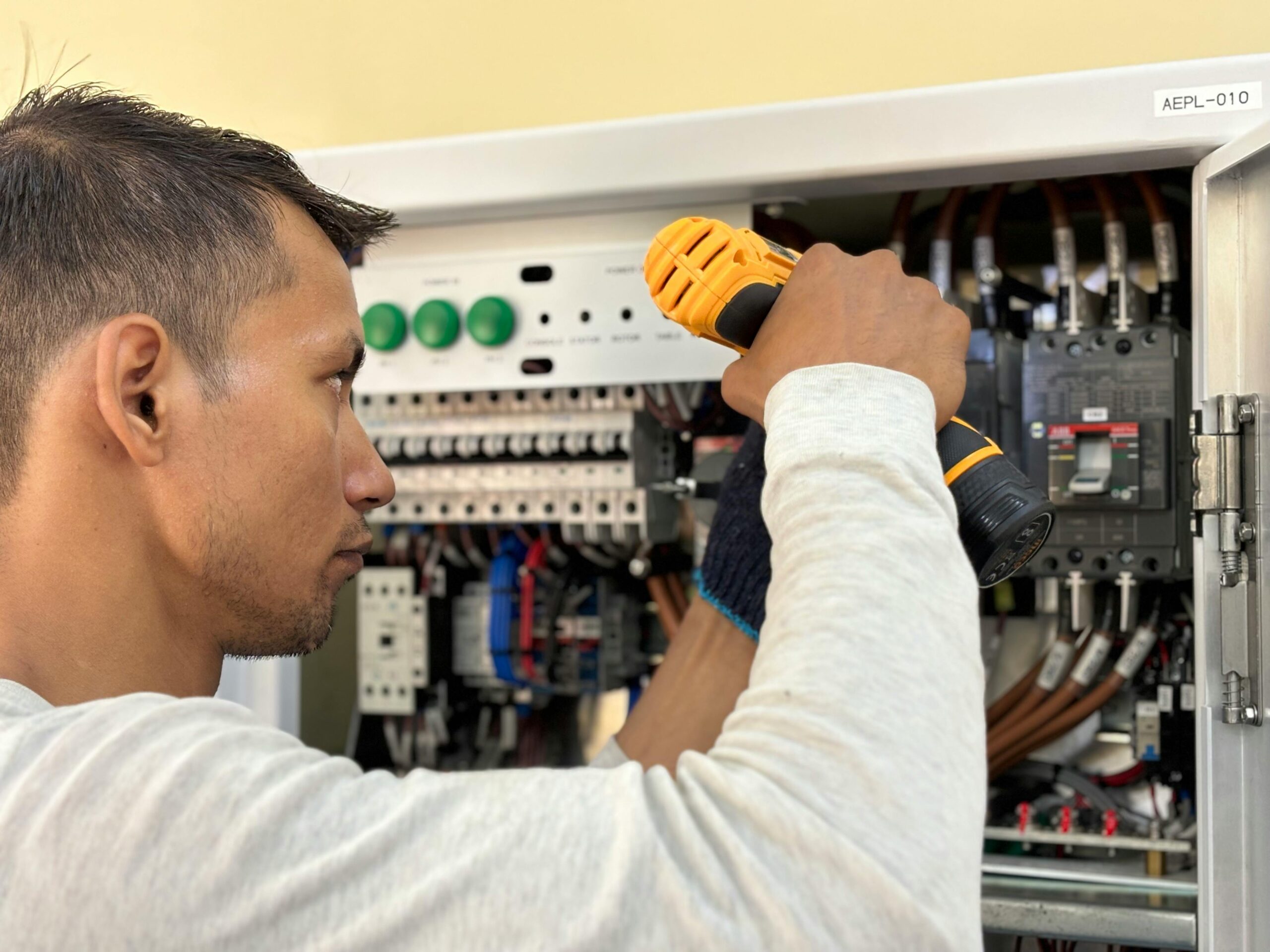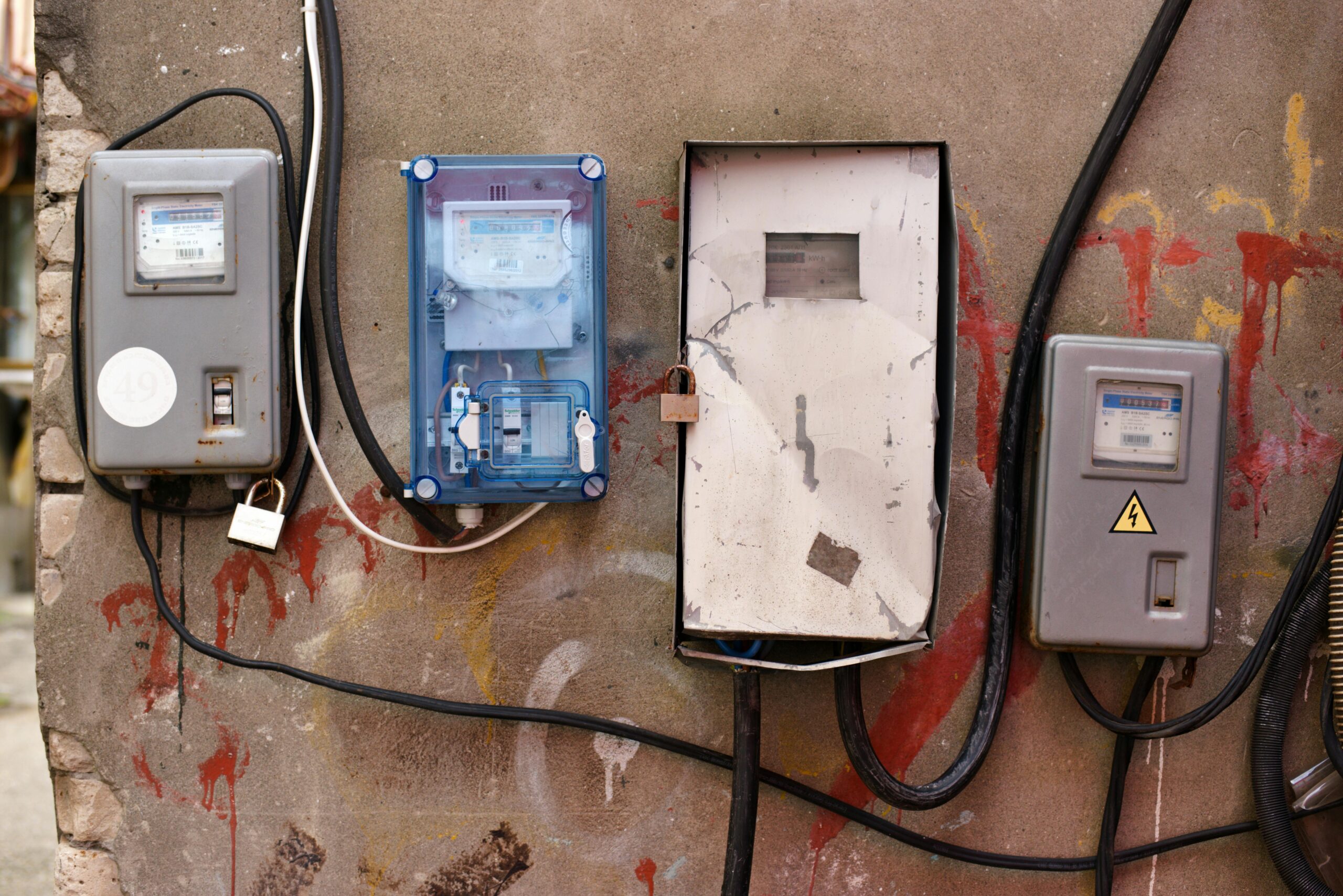Smoke detectors are vital safety devices designed to alert you to the presence of smoke, providing crucial early warning in the event of a fire. Equipping your home with functional smoke detectors can significantly enhance your chances of evacuating safely during an emergency.
In many regions, building codes mandate smoke detector installation in residential properties due to their proven effectiveness in reducing fire-related injuries and fatalities.
The purpose of this article is to provide you with clear and accurate information about whether you need an electrician to replace hardwired smoke detectors.
By understanding the complexities involved, you’ll be able to make an informed decision that ensures the continued safety of your home. The article aims to cover essential aspects, including the technical requirements, potential risks, and steps involved in replacing these critical devices.
Basics of Smoke Detectors
Smoke detectors are vital safety devices designed to detect smoke and alert occupants to the presence of a fire. They play a crucial role in early fire detection, providing critical time to evacuate and minimize potential damage.
Types of Smoke Detectors
There are several types of smoke detectors, each using different technologies to detect smoke:
Ionization Smoke Detectors
These are highly effective at detecting fast-flaming fires. They contain a small amount of radioactive material between two electrically charged plates, which ionizes the air and creates a current. When smoke enters the detector, it disrupts the flow of ions, triggering the alarm.
Photoelectric Smoke Detectors
These are more sensitive to slow-burning, smoldering fires. They use a light source aimed at a sensing chamber. When smoke enters the chamber, it scatters the light, which then triggers the alarm.
Dual-Sensor Smoke Detectors
Combining both ionization and photoelectric technologies, these detectors provide comprehensive fire detection. They are effective against both fast-flaming and slow-smoldering fires, ensuring a higher level of safety.
Hardwired vs. Battery-Operated Smoke Detectors
Smoke detectors can be broadly categorized into hardwired and battery-operated types:
Hardwired Smoke Detectors
Hard-wired smoke detectors are connected directly to the home’s electrical system, offering a more reliable power source. They can be interconnected so that when one detector senses smoke, all alarms in the system sound simultaneously.
Most hard-wired smoke detector options also include a battery backup to ensure operation during power outages.
However, they typically require professional installation, which can increase labor costs, and their need to be connected to the electrical system can restrict placement flexibility.
Battery-Operated Smoke Detectors
These are simple to install and do not require professional help. They can be placed virtually anywhere without the need for wiring.
However, they require regular battery replacement to ensure functionality and typically do not communicate with other units in the home unless specially designed with communication features.
Hardwired Smoke Detectors: An Overview
Hardwired smoke detectors are a crucial component of comprehensive home safety systems. Unlike battery-operated models, these detectors are directly connected to a building’s electrical system, providing a more reliable source of power.
Additionally, they often include a backup battery to ensure functionality during power outages. Hardwired smoke detectors are typically interconnected, meaning that if one alarm is triggered, all alarms in the system will sound, offering a higher level of protection.
What are Hardwired Smoke Detectors?
Hardwired smoke detectors are devices installed within a building’s electrical network to detect smoke and alert inhabitants to potential fire hazards. These detectors are connected to a 120-volt power supply and usually have a 9-volt battery backup.
They are designed to be more dependable than standalone battery-operated alarms, ensuring continuous operation even in the event of a power failure. Many modern hardwired smoke detectors also feature advanced detection technologies like photoelectric sensors, ionization sensors, or a combination of both.
How Hardwired Smoke Detectors Work
Hardwired smoke detectors operate by monitoring the air for signs of smoke, which is often an indicator of fire. When smoke particles enter the device’s detection chamber, they disrupt the sensor’s normal operation.
For ionization detectors, smoke particles interfere with the ion flow, triggering the alarm. For photoelectric detectors, smoke obstructs a light beam, causing it to scatter and hit a sensor, thus sounding the alarm.
In the case of interconnected systems, once one unit detects smoke, it sends a signal to all connected detectors to activate their alarms, ensuring that everyone in the building is alerted promptly.
Typical Lifespan of Hardwired Smoke Detectors
The typical lifespan of hardwired smoke detectors is around 10 years. After this period, the sensors may become less reliable, and it is highly recommended to replace the units to maintain optimal safety standards.
Some manufacturers provide built-in end-of-life warnings, alerting owners when it’s time to replace the detectors. Regular maintenance, including testing alarms monthly and replacing backup batteries annually, can help prolong their effectiveness and ensure they are in working order at all times.
Why Replacement is Necessary
Lifespan and Expiry of Smoke Detectors
Smoke detectors, including hardwired ones, have a finite lifespan. Generally, they are designed to function effectively for about 8-10 years.
As they age, their sensors become less reliable, increasing the risk of failure during an emergency. It’s crucial to replace outdated detectors to ensure optimal functionality and to maintain a safe environment.
Technological Advancements
Over the years, significant advancements have been made in smoke detection technology. Modern smoke detectors are equipped with enhanced features such as dual-sensor alarms, which can detect both smoke and heat and wireless interconnectivity, which allows alarms to communicate with each other throughout a home.
If you’re considering a new hardwired smoke detector installation, it could be because you understand that upgrading your devices is essential to keep your property safe.
Upgrading to the latest technology ensures faster and more accurate detection, providing better protection for you and your family.
Safety and Compliance Standards
Regulations and safety standards for smoke detectors have evolved, necessitating updates to ensure compliance with current guidelines.
A new smoke detector option is often required to meet stricter safety criteria, which older detectors may not meet. By replacing your hardwired smoke detectors, you not only adhere to the latest safety standards but also enhance the overall safety of your property.
Regardless of whether you’re going for battery-powered smoke detectors or other options, functioning smoke alarms are essential since they help alert the fire department of any fires that originate from the existing electrical system.
When to Call an Electrician
Complex Wiring Issues
Replacing either a hardwired or a battery-operated smoke detector can be more complicated than it seems, especially if your home’s wiring is outdated or not clearly labeled. If you encounter complex wiring issues, such as multiple wires of the same color, it’s best to call an electrician.
Professionals have the knowledge and tools necessary to safely handle and identify complex wiring, ensuring that your smoke detectors are correctly installed and functioning properly.
Local Regulations and Permits
In many areas, local building codes and regulations may require that electrical work, including the replacement of hardwired smoke detectors and any smoke alarm, be performed or inspected by a licensed electrician. This is to ensure that the installation meets safety standards and to prevent potential hazards.
Additionally, some jurisdictions may require permits for electrical work. Hiring an electrician can help you navigate these regulations and obtain the necessary permits, ensuring compliance with local laws.
Personal Comfort and Safety Concerns
Even if you are comfortable with basic electrical work, personal comfort, and safety concerns may prompt you to hire a professional. Working with electrical systems carries inherent risks, such as electrical shock or fire hazards.
If you are unsure about your ability to safely complete the installation or if you simply prefer the peace of mind that comes with a professional’s expertise, calling an electrician is a wise choice. Prioritizing safety can prevent accidents and ensure that your smoke detectors are installed correctly and securely.
Benefits of Professional Installation
Ensuring Proper Installation
Hiring a professional electrician to replace hardwired smoke detectors ensures that the installation process is carried out correctly.
Electricians have the knowledge and expertise to handle the electrical connections safely and efficiently. This reduces the risk of improper wiring, which can lead to malfunctioning smoke detectors or even electrical hazards.
Compliance with Local Codes
Professional electricians are well-versed in local building codes and regulations. By opting for professional installation, you can be confident that your smoke detectors will be installed in compliance with these codes.
This not only enhances the safety of your home but also ensures that you avoid any potential legal issues or fines associated with non-compliance.
Peace of Mind and Safety
One of the paramount benefits of hiring a professional electrician is the peace of mind it brings. Knowing that your smoke detectors are installed correctly and functioning properly allows you to rest easy, assured that your home is safeguarded against fire hazards.
Professional installation minimizes the risk of false alarms and ensures that the detectors will operate effectively in the event of an emergency, providing you and your family with an added layer of safety.
Potential Risks of DIY Replacement
Improper Installation
One of the primary concerns with replacing hardwired smoke detectors on your own is the potential for improper installation.
Smoke detectors must be correctly connected to ensure they function properly during an emergency. Mistakes in wiring or mounting can result in malfunctioning devices, which compromise the safety of your household.
Electrical Hazards
Working with electrical wiring carries inherent risks. Without proper knowledge and experience, you might expose yourself to electrical hazards such as shocks or short circuits.
Handling electrical components incorrectly can also lead to more significant issues, such as fire outbreaks, endangering not just your property but also the lives of those within it.
Voiding Warranties
DIY replacement of hardwired smoke detectors can also void any warranties that come with the devices.
Manufacturers often require professional installation to ensure that the units are set up correctly and adhere to all necessary safety standards. Not following these guidelines can invalidate the warranty, leaving you without support or recourse if the smoke detector fails or malfunctions.
How to Choose an Electrician
Licensing and Certification
When selecting an electrician to replace hardwired smoke detectors, it is crucial to ensure they have the proper licensing and certification.
This not only guarantees compliance with local regulations but also ensures that the electrician has undergone the necessary training and possesses the skills needed for the job. Check if the electrician holds a valid license from a recognized authority and inquire about their certification. This will give you the confidence that the work will be performed safely and competently.
Experience and Specialization
Experience is another significant factor when choosing an electrician. An electrician with a wealth of experience is more likely to handle unexpected issues efficiently and deliver high-quality work.
It is also beneficial to find an electrician who specializes in residential electrical systems and smoke detector installations specifically. This specialization indicates a deeper understanding of the specific requirements and complexities involved in the task, ensuring that your smoke detectors are replaced correctly.
Reviews and Recommendations
Lastly, reviews and recommendations provide valuable insights into the reliability and quality of an electrician’s work. Look for online reviews on reputable sites to gauge previous customers’ satisfaction. Additionally, ask friends, family, or neighbors for recommendations.
Personal experiences offer trustworthy information that can help you make an informed decision. Taking the time to read reviews and gather recommendations can save you from potential frustrations and ensure you choose a reputable electrician.
Conclusion
Keynote Takeaways
- Safety First: Always prioritize safety by turning off the power before attempting any work.
- Correct Wiring: Understanding the wiring connections is essential to ensure the new smoke detectors function correctly.
- Professional Help: For those unfamiliar or uncomfortable with electrical work, hiring a professional electrician is the safest option.
In summary, determining whether you need an electrician to replace hardwired smoke detectors depends largely on your experience and comfort with electrical work.
While replacing the detectors may seem straightforward, it involves dealing with the home’s electrical system, which can pose risks if not handled correctly. Key points to consider include ensuring the power is turned off, identifying the correct wiring connections, and securely installing the new detectors.
For most homeowners, the best course of action is to consult or hire a licensed electrician. This ensures that the smoke detectors are installed correctly and safely, providing peace of mind and reliable protection against fire hazards.
If you have the necessary skills and experience, you might choose to perform the replacement yourself, but always exercise caution and follow all safety protocols.
We help companies refine their messaging, hone in their sales process, and grow their pipeline – all with a new website.




